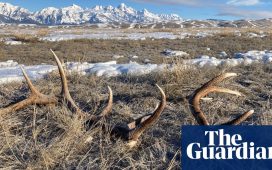Wolves could become extinct again in Denmark and other lowland European countries unless the population is topped up by migrating animals, according to a new study.
A wolf pack crossed the border from Germany into Denmark in 2017, ending a 200-year absence of wolves in the country. But 48% of Denmark’s wolf population has subsequently been illegally killed or disappeared, with shooting the only plausible explanation.
Wolves have thrived in lowland Europe in recent years, with populations increasing by more than a third annually in Germany between 2000 and 2015. Protected by EU legislation, German-born wolves have recolonised Denmark, Belgium, the Netherlands and parts of France.
But a study of the 35 wolves, which DNA evidence shows had moved north into Denmark, published in Conservation Letters, has found that mortality rates are 10 times higher than normal in the country. In Schleswig-Holstein – Germany’s northern-most state, which borders Denmark – the main cause of death is traffic, particularly on the fast motorways around Hamburg.
In less-populated Denmark, there have been no traffic fatalities, but just nine of 27 wolves recorded in the country were still alive at the start of 2020. Four had crossed south to Germany, one died of natural causes, one was a confirmed illegal killing and 12 have disappeared. The life expectancy for a Danish wolf is just two years.
“Unfortunately, it’s not surprising. This is part of a pattern we have seen in a lot of countries. Typically they just disappear and are never found,” said lead author Professor Peter Sunde of Aarhus University.
Research has shown that the key to the wolf’s resurgence in lowland Europe has been the animal finding sanctuary in large military training areas, particularly in Germany, where they can breed untroubled by persecution. When wolves leave the safety of these restricted zones, they can find plenty of food, even in suburban areas, but are much more prone to persecution.

According to Sunde, wolves are particularly vulnerable in countries such as Denmark, which have lots of private landowners, rather than large state forests such as Finland and Sweden. “A wolf during a year will probably encounter people hundreds of times, and they only need to encounter one hostile person with a weapon once to die,” he said. Ecologists calculate that the Danish part of the Jutland peninsula – a farmed landscape similar to lowland Scotland with just 13% forest cover – has space for 10 wolf packs.
The animals that cross over from Germany are not believed to be targeted by sheep farmers, who comprise a fairly small number in Denmark, but by hunters who dislike the predator for taking deer they want to shoot.
Sunde stressed their study provided no evidence as to who was behind the Danish wolf killings but added: “It is usually hunters who drive this, because they consider the wolf as a resource competitor. Red deer hunters have the weapons and they can get a shot at the wolf. That’s where you have the big interest, the big money and also the big feelings.
“We have anarchy in a nutshell – a powerful group who can enforce their will by illegal actions.”
Some argue that allowing licensed “culls” of wolves can reduce rates of illegal persecution by reassuring groups such as hunters or livestock farmers that populations won’t be allowed to rise indefinitely. But a study in Finland suggested that a legal “harvest” of wolves actually increased the likelihood of illegal killing.
“Right now we have legislation that protects wolves, and it’s not working because a minority don’t follow the rules,” said Sunde.
“The solution must be changing attitudes. As long as you have people who are willing to break the law it’s almost impossible to control this or police this because this is crime that happens on people’s own properties.”








